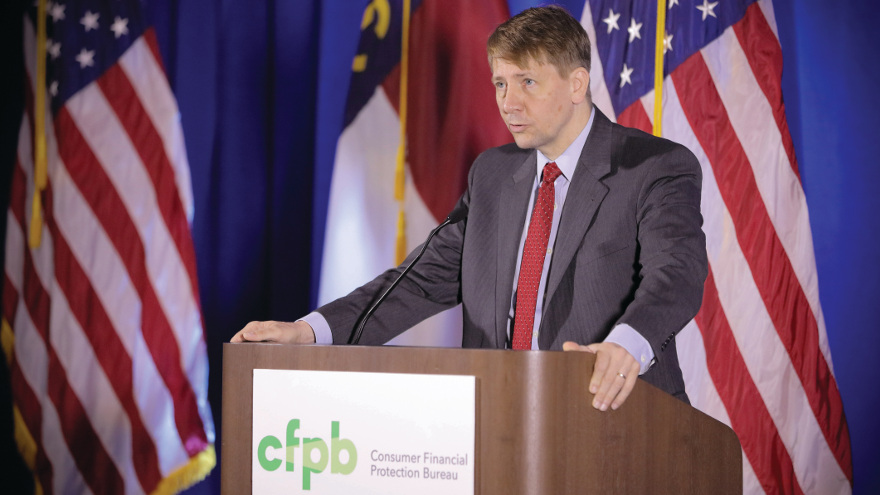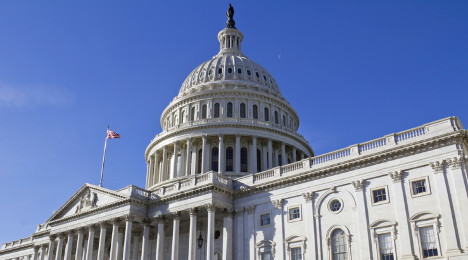The chairman of the House Financial Services Committee wants a definitive answer to a question that both he and Consumer Bankers Association president and chief executive officer Richard Hunt have been asking for some time: Is Consumer Financial Protection Bureau director Richard Cordray departing the regulator to run for governor in Ohio?
Rep. Jeb Hensarling, the committee chair and Texas Republican who often has clashed with Cordray during hearings, delivered a letter to the CFPB director asking for written confirmation by today about any political aspirations in the Buckeye State. The letter, made available here by the National Association of Federally-Insured Credit Unions, asked for clarification as the CFPB is compiling a new rule associated with small-dollar lending.
Hensarling’s inquiries to Cordray included:
—Categorical denial that political considerations have informed any aspect of decisions, orders and communications relating to this rule
—Assurance that all records relating to this rulemaking will be preserved
—Confirmation that Cordray intends to serve his full statutory term as bureau director, or, if he does not intend to serve the full term, confirmation of the date on which he intends to resign from office
Hensarling’s letter referenced multiple media reports originating out of Ohio where sources close to Cordray hinted at his governorship aspirations. The reports seemed to exacerbate Hensarling’s inquiry in light of the CFPB’s latest rule-making agenda.
“Simply put, there is no valid legal basis for accelerating a federal rulemaking to satisfy an arbitrary deadline necessitated by election dates established under Ohio law. If this is the case, it undoubtedly opens the bureau’s rule up to legal challenge,” Hensarling wrote.
Meanwhile, Hunt also raised the issue upon hearing word of Cordray’s upcoming schedule. Hunt noted that Cordray is scheduled to speak at the Ohio Land Bank Conference in Cleveland on Sept. 12. He also mentioned that Cordray is rumored to appear at an Ohio AFL-CIO Labor Day picnic.
Hunt asked in a blog post, “Could these appearances have implications for a potential run for office?”
Hunt continued with, “It is well past time director Richard Cordray clarify his intentions to run for public office as the speculation has become a distraction and now casts a shadow over the impartiality of the CFPB. We need to have stability at the CFPB.
"The current limbo — will he or won't he? — is just the latest reason why a Senate-confirmed, bipartisan commission must be established at the CFPB. A diverse group of experts directing and formulating agency policy — not a single director — would ensure consumers receive a balanced, deliberative and thoughtful approach to regulation,” Hunt went on to say.
“Furthermore, director Cordray has not in over two years named a permanent deputy director to be second in command. The markets and consumers demand stability, and announcing his intentions is just the right thing to do,” Hunt added.
While some lawmakers on Capitol Hill continue to work toward a major restructuring or perhaps even a complete dismantling of the Consumer Financial Protection Bureau, one of the leaders of the American Recovery Association cautioned the industry about developments this summer in Pennsylvania by the attorney general to establish a division similar to this federal agency.
In fact, the individual appointed to lead this unit within the Keystone State’s attorney general’s office actually was the fourth employee ever to come aboard at the CFPB.
To recap, back in July, Pennsylvania attorney general Josh Shapiro created what he called a consumer financial protection unit. Leading this operation is Nicholas Smyth, who before joining the CFPB was part of a team at the U.S. Treasury Department that drafted and revised the CFPB’s enabling act, the Consumer Financial Protection Act of 2010 (Title X of the Dodd-Frank Act).
Smyth brings significant expertise in auto finance to this post in Pennsylvania. At the CFPB, Smyth led the investigation of Drivetime Automotive Group, which resulted in an $8 million settlement related to allegations associated with what the bureau deemed to be harassing debt collection calls and providing inaccurate credit information to credit reporting agencies.
“Protecting the public from financial scams is a key priority of mine, and Nick Smyth will help us expand our capacity to bring complex cases against financial companies that try to rip off Pennsylvanians,” Shapiro said.
“I am honored to join the attorney general’s terrific consumer protection team,” Smyth added. “The Consumer Protection Bureau saves Pennsylvania families millions of dollars each year, and I am excited to contribute to this great work.”
All of the developments caught the attention of David Kennedy, who is vice president and director of compliance at the American Recovery Association. Kennedy, who also is the chief executive officer of First Credit Resources, cautioned how this new enforcement unit could impact repossession agencies and other third-party providers that participate in recoveries.
“A lot of you thought you would never see an agent from the CFPB or a CFPB-type agency because of your size. Well, I can assure you now, if you are located in Pennsylvania, your chances just went from zero to ‘see you next year,’ maybe even late this year,” Kennedy said in a message distributed by ARA and obtained by SubPrime Auto Finance News.
“We all know how this is going to go,” he continued. “When one state does it, the other states will watch to gauge the success and then jump on the band wagon. All your small clients who have not placed the same importance on compliance as ARA has done and have continued to use off-duty police, constables, sheriffs, or just unlicensed repossessors, have much to fear.
“Our loyal members who have taken advantage of the ARA webinars and compliance testing, have instituted the policies and procedures we have been going over for at least three years, have taught their street-level employees the information, and have created the culture of compliance that we as an association have been constantly and consistently talking about, have nothing to fear,” Kennedy went on to say.
For more details about compliance and other operational resources at ARA, go to www.repo.org.
Another scathing report originating out of the U.S. House Financial Services Committee again chastised the Consumer Financial Protection Bureau while reminding the agency to consider what it’s like for finance companies that comply with the CFPB’s civil investigation demands, also known as CIDs.
Majority members charged CFPB director Richard Cordray for contempt of Congress due to his default in providing requested information associated with the bureau’s new arbitration rule set to go into effect on Sept. 18. The report claims lawmakers’ requests have been “burdensome” as the agency has provided thousands of pages of documents.
Republican lawmakers on the committee replied back in part charging that the CFPB now has a sense of the ordeal finance companies face.
“As part of its rules relating to investigations the CFPB can issue CIDs, which are similar to a subpoena in that they are a form of legal compulsion,” the report said. “The CFPB’s rules allow a recipient of a CID to petition the director to modify or set aside the CID. The rules require that these petitions ‘shall set forth all factual and legal objections to the civil investigative demand, including all appropriate arguments, affidavits, and other supporting documentation.’
“Director Cordray himself rules on these petitions. What is conspicuous about the CFPB’s claims of burden is that in director Cordray’s rulings he holds the recipients of the CFPB’s CIDs to the same or higher standards than the committee applies here — a standard that requires a detailed explanation of burden,” the report continued.
“Director Cordray routinely denies lengthy petitions alleging that CFPB CIDs are burdensome, and yet in response to the (requests) he has provided only limited data,” the report went on to say.
The lawmakers’ report goes on to mention that the CFPB’s production of 2,362 pages of records (or even potential review of 10,000 discrete records) “pales in comparison to what the CFPB regularly requires of its CID recipients.”
The report also noted, “… in any event, the CFPB has never suggested that it does not understand what has been called for; it simply deems the articulated interest too broad and hence burdensome.”
This 36-page report, which is available here, arrived a little more than a week after the House approved resolution leveraging authority provided under the Congressional Review Act (CRA) to stop the bureau’s final rule prohibiting the use of class action waivers in arbitration clauses.
In order for the rule to be stopped, the Senate must approve a similar action, but that chamber has yet to take a vote on its proposal.
As the company acknowledged an inquiry from the Consumer Financial Protection Bureau, Credit Acceptance leadership discussed its sales force during a good portion of its latest conference call with investment analysts.
Credit Acceptance shared as a part of its second-quarter finance report that the company expanded its sales team by “roughly” 20 percent year-over-year in an effort to broaden its active dealer network, which stood at 7,635 as of June 30. On the same date a year earlier, the figure stood at 7,181.
The company classifies active dealers as ones who have received funding for at least one contract during the quarter.
Chief executive officer Brett Roberts described the volume of active dealers joining the company’s network as “OK,” acknowledging the 910 stores to sign up during the second quarter marked a 13.9-percent improvement versus the same quarter a year ago.
“But sequentially we had a decline in active dealers,” Roberts said. “So I guess the goal, obviously, is to sign up more dealers than we’re losing. We didn’t do that in Q2, but we hope to do that in the future.”
The company also noted its dealer attrition rate deteriorated slightly in Q2, rising to 21.5 percent. A year earlier, the rate stood at 17.5 percent.
Credit Acceptance defines attrition according to the following formula: Decrease in consumer loan unit volume from dealers who have received funding for at least one dealer loan or purchased loan during the comparable period of the prior year but did not receive funding for any dealer loans or purchased loans during the current period divided by prior year comparable period consumer loan unit volume.
Roberts pointed out that Credit Acceptance’s current sales team is double the size of what it had been a few years ago, and the company is expecting to “increase it a little bit more.”
Roberts told conference call participants, “I think if you look at the last time we increased the sales force, it took us about two years to roughly double the sales force, and really, almost three years before productivity got to where it was before we started the expansion. So it was overall about a five-year process to double the sales force.
“We’re not trying to double it this time, and hopefully, we’ve learned a little bit from the first time. But it’s still more of a long-term driver than a short-term driver,” he continued.
With a larger team comes more expenses. Credit Acceptance reported for Q2 that its 11.9 percent or $6.5 million increase in operating expenses stemmed from an increase in salaries and wages expense of $2.6 million, or 8.6 percent. This was primarily related to our servicing function as a result of an increase in the number of team members along with an increase in sales and marketing expense of $2.5 million, or 21.0 percent, due to an increase in the size of its sales force.
Roberts explained that having a robust sales force can help Credit Acceptance navigate the challenges of a competitive auto-finance landscape.
“Our outlook is that we're planning on the current difficult environment lasting for the foreseeable future,” Roberts said. “And if that turns out to be too pessimistic, then that’s great. But that’s what we’re planning for. And so I guess we look at the numbers. We feel like our chances of growing are a lot better if we have a little bit larger sales force, so that's what we're working toward.
“We had two quarters of negative unit volume change. And this quarter was up, but it was only up 1 percent,” he continued. “I don’t think that the additions to the sales force really added much to that at this point. They’re very new. They’re still getting up to speed. And I think, again, the increase in the sales force is something that will pay off next year or the year after. Probably not this year.”
Overall performance
As Roberts mentioned, Credit Acceptance generated a 1-percent year-over-year lift in origination volume during the second quarter. The amount financed grew by a larger amount, 7.1 percent year-over-year.
“Dollar volume grew faster than unit volume during the second quarter of 2017 due to an increase in the average advance paid per unit,” the company said. “This increase was the result of an increase in the average size of the consumer loans assigned primarily due to an increase in the average initial loan term and an increase in purchased loans as a percentage of total unit volume, partially offset by a decrease in the average advance rate due to a decrease in the average initial forecast of the consumer loans assigned.
“While we were able to grow unit volume modestly during the most recent quarter after two quarters of declines, our overall progress in growing unit volumes has slowed considerably over the last six quarters,” Credit Acceptance officials continued. “This trend reflects the difficulty of growing the number of active dealers fast enough to offset the impact of the competitive environment on attrition and per dealer volumes.
“In addition, in response to the decline in forecasted collection rates experienced in 2016, we adjusted our initial collection forecasts downward during 2016. While the adjustments have been modest, we believe these adjustments have had an adverse impact on unit volumes,” the company went on to say.
All told, Credit Acceptance reported that its Q2 consolidated net income came in at $99.1 million, or $5.09 per diluted share, up from $84.9 million, or $4.17 per diluted share, for the same period in 2016.
After seeing the top-line metrics, the investment community pushed Roberts for some clarity on how Credit Acceptance portfolio vintages are performing in an effort to spot future trends.
I think that the clearest number to start with if you're trying to understand loan performance is the net cash flow change for the quarter that’s disclosed,” said Roberts, who noted that the company’s Q2 total net cash flow change was $8.8 million. “It’s a positive number, but it’s obviously a very small one.
“The total undiscounted cash flows that we’re attempting to forecast are somewhere around $5.8 billion,” Roberts continued. “So when you have an $8.8 million move, that’s basically flat.”
After the analyst rephrased the question, Roberts added, “Again, I think the main takeaway is if you’re looking at $5.8 billion in cash flows we’re trying to forecast, if you look at the results for this quarter or really over the last six quarters or even longer than that, the cash flows have been remarkably stable. So I think that's a good thing, and that’s really the main takeaway
CFPB matters
Credit Acceptance stated its quarterly filing with the Securities and Exchange Commission that the company now is contending with an inquiry from the CFPB along with ongoing actions involving the Federal Trade Commission and Maryland’s attorney general.
“As of June 2017, we were informed that the Consumer Financial Protection Bureau’s Office of Fair Lending and Equal Opportunity is investigating whether the company may have violated the Equal Credit Opportunity Act and Regulation B,” Credit Acceptance said in its SEC filing.
“We are cooperating with the inquiry and cannot predict the eventual scope, duration or outcome at this time. As a result, we are unable to estimate the reasonably possible loss or range of reasonably possible loss arising from this inquiry,” the company continued.
During the conference call, Wall Street observers asked Roberts to elaborate about what the CFPB inquiry is entailing.
“We don’t have a lot to add to what's in the (filing),” Roberts said. “The CFPB is fairly sensitive regarding disclosures of ongoing matters, so we try carefully to walk the line between our obligations to the SEC and to shareholders and the sensitivities of the CFPB. So I won’t try improve upon what we put in the (filing).”
The filing indicated that the inquiry from the FTC stems from Credit Acceptance allowing dealers to use GPS and starter interrupt devices while Maryland’s attorney general is looking into the company’s repossession and sale policies and procedures within the state.
Now Reynolds and Reynolds only has seven states to go to cover all of the U.S. with resources from its LAW F&I Library — a comprehensive catalog of standardized, legally reviewed finance and insurance (F&I) documents for franchised dealers.
Reynolds recently released the LAW F&I Library into three more locations — Nebraska, New Hampshire and Rhode Island — lifting the company’s compliance footprint to 43 states. These documents can be used by dealership F&I offices to complete the vehicle sales process with buyers.
“We are pleased to announce the availability of the LAW F&I Library in Nebraska, New Hampshire and Rhode Island,” said Jerry Kirwan, senior vice president and general manager of Reynolds Document Services. "Dealers will continue to face growing expectations from consumers for a more engaging and smoother car-buying experience. The documents in the LAW Library are written in consumer-friendly language to help create a more efficient, transparent and understandable F&I process in every transaction.
“By increasing the efficiency of the F&I process, dealers can deliver a better customer experience for buyers at the dealership,” Kirwan continued.
Kirwan also noted LAW brand documents can help dealers keep pace with regulatory developments in automotive because the documents in the LAW F&I Library are regularly reviewed and updated for legal sufficiency. Reynolds' industry-leading forms specialists manage the review alongside Reynolds' outside legal partners.
In addition, the printed documents in the LAW F&I Library are available in digital format, which can help facilitate the conversion to laser-printed forms and e-contracting transactions. Reynolds Document Services maintains licensing agreements with all major providers of electronic F&I (e-F&I) solutions.
Now with Nebraska, New Hampshire and Rhode Island in the offering portfolio, other states where Reynolds resources are available include: Alabama, Alaska, Arizona, Arkansas, California, Colorado, Delaware, Georgia, Hawaii, Idaho, Illinois, Indiana, Iowa, Kentucky, Louisiana, Maine, Maryland, Massachusetts, Michigan, Mississippi, Missouri, Montana, Nevada, New Jersey, New Mexico, New York, North Carolina, Ohio, Oklahoma, Oregon, Pennsylvania, South Carolina, Tennessee, Texas, Utah, Vermont, Virginia, Washington, West Virginia and Wyoming.
CounselorLibrary.com, publisher of automobile financing and leasing legal compliance services and part of the Hudson Cook portfolio, announced that it has updated its popular CARLAW F&I Legal Desk Book. Winner of the Axiom Business Book Award, the book gives readers 363 things to know about dealer finance laws and regulations.
Now in its seventh edition, CARLAW F&I Legal Desk Book — The Answer Book for Finance and Insurance Professionals, presents a law-by-law, regulation-by-regulation guide through the legal maze that dealers face every day. Authored by Thomas Hudson, Michael Benoit, Ralph Rohner and the attorneys at Hudson Cook, this new edition reflects the latest updates to the federal laws and regulations affecting F&I practices.
“Formatted in a straightforward Q and A design, (the book) addresses many of the everyday compliance issues dealers face and includes links to the actual laws and regulations discussed in each chapter,” the publisher said.
The 390-page book is designated as the official textbook for the Association of Finance and Insurance Professionals’ Certified F&I Professional Program, and is available for $49.95 (plus shipping and handling) by going to this website.
Now it’s the Senate’s turn.
The House approved resolution on Tuesday leveraging authority provided under the Congressional Review Act (CRA) to stop the Consumer Financial Protection Bureau’s final rule prohibiting the use of class action waivers in arbitration clauses.
Despite all House Democrats and one Republican voting against H.J. Res 111, the resolution cleared the chamber by a vote of 231-190.
In order for the CFPB’s new mandate to keep from going into effect on Sept. 18, the Senate needs a simple majority vote approving a similar resolution; an action both the American Banking Association and Consumer Bankers Association hope happens soon.
“We applaud members of the House for taking a stand on behalf of consumers by voting to overturn the CFPB’s arbitration rule. Today’s action is critical to ensuring the Bureau doesn’t provide trial lawyers with a regulatory windfall at consumers’ expense,” ABA president and chief executive officer Rob Nichols said in a statement. “We thank House lawmakers for today’s vote, and urge members of the Senate to join them in overturning this anti-consumer rule.”
In a separate statement, CBA president and CEO Richard Hunt added, “Today’s House vote is a resounding victory for consumers. Consumers’ access to arbitration, which has long provided a faster, more cost-effective and higher recovery alternative to class action lawsuits, should not be undermined by a harmful rule resulting from an incomplete study by the CFPB.
“We encourage the Senate to follow the House’s lead and overturn this anti-consumer arbitration rule,” Hunt went on to say.
All cheering the House's action was Steve Jordan, CEO of the National Independent Automobile Dealers Association. Jordan said the House vote is "encouraging" to the association, which represents the more than 40,000 independent dealers doing business nationwide.
"It's encouraging to see Congress act so swiftly to oppose a rule that obviously disregards the best interests of consumers," Jordan said. "We urge members of the Senate to act just as swiftly and decisively to keep this unnecessary and harmful regulation from taking effect."
Members of the Senate Banking Committee filed their resolution last Thursday but information available through the upper chamber’s website doesn’t indicate when a vote might occur. When it does, Republican support appears strong.
“While I appreciate the need for strong consumer protections, this rule does not strike the right balance in helping consumers resolve disputes,” said Sen. Bob Corker of Tennessee.
And Sen. Ben Sasse of Nebraska took an even stronger position against what the bureau, led by director Richard Cordray, has done.
“Congress, not King Richard Cordray, writes the laws,” Sasse said. “This resolution is a good place for Congress to start reining in one of Washington’s most powerful bureaucracies.”
Meanwhile, Rep. Maxine Waters, a California Democrat and ranking member of the House Financial Services Committee, shared her disappointment that only one of the chamber’s Republican lawmakers opposed the arbitration resolution.
“Forced arbitration benefits large corporations and Wall Street banks to the detriment of consumers,” Waters said. “The Consumer Financial Protection Bureau’s rule helps to ensure that financial institutions are held accountable, and fully protects the legal rights of consumers, including servicemembers and veterans.
“Republicans have shamefully moved to nullify the Consumer Bureau’s good work, in a move that ultimately enables financial institutions to get off the hook when they commit wrongdoing, with less redress for consumers,” she continued. “This resolution steamrolls over the Consumer Bureau’s sensible rule, without regard for the harm that will result for American consumers and families.”
And consumer groups such as the Center for Responsible Lending (CRL) aren’t pleased with the House vote, either.
“Wall Street and predatory lenders want to cheat consumers out of their hard-earned money and get off scot-free. They want to stop Americans from exercising their seventh amendment right to have their day in court,” said Melissa Stegman, CRL’s senior policy counsel.
House and Senate lawmakers wasted little time in using Congressional Review Act (CRA) authority to start an effort to stop the Consumer Financial Protection Bureau’s final rule prohibiting the use of class action waivers in arbitration clauses.
The CRA permits Congress to overturn an agency rule within 60 legislative days after an agency has submitted the rule to Congress, with a simple majority vote. The rule appeared in the Federal Register on Wednesday, meaning that barring a literal act of Congress, this regulation is effective on Sept. 18.
In the House, a resolution was sponsored by Rep. Keith Rothfus, a Pennsylvania Republican.
“As a matter of principle, policy and process, this anti-consumer rule should be thoroughly rejected by Congress, and I applaud Congressman Rothfus for leading the effort in the House to do just that,” said House Financial Services Committee Chairman Jeb Hensarling, a Texas Republican.
“In the last election, the American people voted to drain the D.C. swamp of capricious, unaccountable bureaucrats who wish to control their lives. I can think of no better example of such bureaucrats than those at the CFPB. This CRA is a critical step towards fulfilling our promise to the American people and truly protecting consumers,” Hensarling said.
Sen. Mike Crapo, an Idaho Republican and chairman of the Senate Banking Committee, is leading the charge with his Republican colleagues on a resolution from Congress’ upper chamber.
“Members of Congress previously expressed concerns with the proposed version of the rulemaking – concerns that were not addressed in the final rule,” Crapo said. “The rule is based on a flawed study that leading scholars have criticized as biased and inadequate, noting that it could leave consumers worse off by removing access to an important dispute resolution tool.
“By ignoring requests from Congress to reexamine the rule and develop alternatives between the status quo and effectively eliminating arbitration, the CFPB has once again proven a lack of accountability,” he continued. “Given the problems with the study and the bureau’s failure to address significant concerns, it is not only appropriate but incumbent on Congress to vote to overturn this rule.”
Two leading banking industry organizations immediately cheered the lawmaker actions.
—From Rob Nichols, who is president and chief executive officer of the American Bankers Association: “We applaud … members of the Senate Banking and House Financial Services Committees for putting consumers first, and taking the first steps to overturn the CFPB’s misguided arbitration rule.
“In moving forward with the rule, the CFPB chose to ignore the results of its own study — which found that consumers fare far better in arbitration — and instead promote class action lawsuits designed to benefit trial lawyers at consumers’ expense. The CFPB’s study found that consumers receive nothing at all in nearly nine out of 10 class action lawsuits, while people who prevail in arbitration receive $5,389 on average compared to just $32.35 in litigation.
“In reality, the vast majority of disputes get resolved quickly and amicably without the need for arbitration or legal action. If arbitration disappears, the Bureau will force consumers to navigate an already overcrowded legal system where the only winners will be trial lawyers. We think our customers deserve better, and we urge lawmakers in both chambers of Congress to overturn this anti-consumer rule as soon as possible.”
—From Richard Hunt, who is president and CEO of the Consumer Bankers Association: “Arbitration has long provided a faster, more cost-effective and higher recovery means of addressing consumer disputes than class action lawsuits. The CFPB’s own study shows the average consumer receives $5,400 in cash relief when using arbitration and just $32 through a class action suit.
“The real benefactors of the CFPB’s arbitration rule are not consumers, but trial lawyers who pocket over $1 million on average per class action lawsuit. Additionally, class action attorneys take on average 21 percent from their clients’ cash recoveries while some take as much as 63 percent. We encourage both the Senate and the House to move swiftly and overturn the CFPB’s anti-consumer arbitration rule.”
Meanwhile, consumer-facing organizations such as People’s Action expressed frustrations about what these lawmakers put in motion. Legacy organizations that created People’s Action a year ago include Alliance for a Just Society, Center for Health, Environment and Justice, Institute for America's Future, National People’s Action and USAction Education Fund.
“Once again Republicans in Congress have stood up tall and declared themselves firmly on the side of big banks and payday lenders, even when they break the law,” People’s Action said in a statement. “Today’s cynical, industry bought-and-paid-for move to invalidate the CFPB’s new arbitration rule, is possibly the most blatant anti-consumer move by Congress yet.
“Forced arbitration strips consumers of the right to seek restitution from a judge when they are harmed. Forced arbitration is a proposition totally stacked in the predators’ favor,” the organization continued.
“Forced arbitration allows banks like Wells Fargo to keep massive law-breaking scams like their fraudulent account scandal out of the courts and the public’s eye, which they did for years before the CFPB stepped in and shut down the Wells Fargo account scheme. By trying to invalidate the CFPB’s arbitration rule, Congress wants to lock our families out of the courts and keep them from bringing big banks to justice,” People’s Action went on to say.
People’s Action added that “the public is not fooled,” while referencing a poll by Americans for Financial Reform found 78 percent of Americans want more Wall Street regulation.
“But Congressional Republicans aren’t listening to their voters, they’re listening to their donors,” People’s Action said.
A press conference hosted by the House Financial Services Committee can be viewed here or via the window at the top of this page.
Well, the clock now is officially running with regard to the Consumer Financial Protection Bureau’s final rule prohibiting the use of class action waivers in arbitration clauses.
The rule appeared in the Federal Register on Wednesday, meaning that barring a literal act of Congress, this regulation is effective on Sept. 18.
While the industry certainly is gearing up for significant pushback before that date, one of the CFPB’s fellow regulators questioned how the new policy is structured.
Last week, acting Comptroller of the Currency Keith Noreika delivered a letter to CFPB director Richard Cordray spelling out several questions similar to ones raised by organizations such as the American Financial Services Association and the National Independent Automobile Dealers Association. The Office of the Comptroller of the Currency (OCC) wanted the data the CFPB used to develop and support the final rule.
“The OCC has a mandate to ensure the safety and soundness of the federal banking system. A variety of OCC staff have reviewed the CFPB’s arbitration proposal from this perspective and have expressed concerns about its potential impact on the institutions that make up the federal banking system and its customers,” Noreika wrote in a letter dated July 10.
“As you know, arbitration can be an effective alternative dispute resolution mechanism that can provide better outcomes for consumers and financial service providers without the high costs associated with litigation,” Noreika continued. “As some have noted, the CFPB’s proposal may effectively end the use of arbitration in cases related to consumer financial products and services. Eliminating the use of this tool could result in less effective consumer protection and remedies, while simply enriching class-action lawyers.
“At the same time, the proposal may potentially decrease the products and services offered to consumers, while increasing their costs. The proposal also may force institutions to confront ‘potentially ruinous liability’ and to settle unmeritorious claims to mitigate the significant costs and risks associated with class-action law suits,” Noreika went on to say.
Noreika then delved into how the new rule could impact the banking system and how finance companies and dealerships could tap its financial resources.
“The increased cost associated with litigation and the loss of arbitration as a viable alternative dispute resolution mechanism could adversely affect reserves, capital, liquidity, and reputations of banks and thrifts, particularly community and midsize institutions,” he wrote.
“While staff have raised these questions, we can only answer them through shared analysis of your agency's data,” Noreika added.
Cordray complied with the OCC’s request, making arrangements to send data to the agency on Tuesday, based on a statement sent to SubPrime Auto Finance News.
“I appreciate director Cordray’s decision to share his agency’s data and analysis used to develop and support the final rule that will be published in the Federal Register,” Noreika said. “Consenting to share the data is important progress.
“I look forward to working with the OCC staff to conduct an independent review of the data and analysis in a timely manner to answer my prudential concerns regarding what impact the final rule may have on the federal banking system,” he continued.
SubPrime Auto Finance News also obtained the letter Cordray wrote to Noreika and the OCC regarding the data request. Cordray began by asserting his position on what the OCC sought.
“First, let me be clear that we are happy to share the data underlying our rulemaking. I understand that our teams are in communication and we are in the process of assembling the data your staff has requested,” Cordray wrote.
Then Cordray delved into wondering why the OCC might have issues with this arbitration ban.
“I continue to fail to see any plausible basis for your claim that the arbitration rule could somehow affect the safety and soundness of the banking system. The economic analysis of the rule shows that its impact on the entire financial system (not just the banking system) is on the order of less than $1 billion per year,” Cordray wrote.
“Even if you think that estimate could be off by some amount, the banks alone made over $171 billion in profits last year,” he continued. “So on what conceivable basis can there be any legitimate argument that this rule poses a safety and soundness issue?”
Cordray also mentioned that Congress explicitly banned arbitration agreements in the mortgage market, “which is larger than all these other consumer finance markets combined. Yet nobody suggests that outcome poses a safety and soundness issue.
“So while you may disagree with the policy judgments for the rule, I question why it would be appropriate to distort the Financial Stability Oversight Council (FSOC) process to review a claim that is so plainly frivolous, when congressional and judicial forums are available to pursue such matters,” Cordray continued.
“Again, I would be interested to know more about what you view as the basis for your claim here. As for timing, I signed the final rule and we sent it to the Federal Register for publication before you raised these issues on July 10. Feel free to call me anytime to discuss these matters further,” Cordray went on state.
And as far as that act of Congress, House Financial Service Committee chairman Jeb Hensarling certainly appears poised to use lawmaker powers to stop this rule.
“This bureaucratic rule will harm American consumers but thrill class action trial attorneys,” said Hensarling, a Texas Republican. “As a matter of principle, policy and process, this anti-consumer rule should be thoroughly rejected by Congress under the Congressional Review Act.
“In the last election, the American people voted to drain the D.C. swamp of capricious, unaccountable bureaucrats who wish to control their lives,” Hensarling continued. “Congress must work with President Trump to make good on this mandate by fundamentally reforming the CFPB and dismantling the administrative state.”
The clash in Congress over this CFPB rule is likely to mirror so many other conflicts occurring on Capitol Hill nowadays.
“I applaud the Consumer Financial Protection Bureau for finalizing this important rule to clamp down on forced arbitration,” said Rep. Maxine Waters, a California Democrat and ranking member of the House Financial Services Committee.
“No consumer should ever be forced to sign away their legal rights in order to open a bank account, obtain a credit card, finance a car or obtain a private student loan so that they can pursue their education,” Waters continued. “The bureau’s rule is a critical step in stopping this problematic practice, ensuring that financial institutions are held accountable, and protecting consumers, including service members and veterans.”
A broad collection of industry representatives already is gearing up to generate a significant pushback against the Consumer Financial Protection Bureau, which earlier this week spelled out a new rule prohibiting the use of class action waivers in arbitration clauses.
And a pair of legal practitioners reached by SubPrime Auto Finance News gauged how successful these groups might be in persuading Congress to squash this bureau mandate. Randy Henrick is an auto dealer compliance expert who offers compliance consulting services to dealers at www.AutoDealerCompliance.net. He served for 12 years as Dealertrack’s lead regulatory and compliance attorney.
“Despite CFPB director Richard Cordray’s fanfare in announcing the rule for the alleged protection of consumers (even though the CFPB’s own study revealed that it is class action plaintiffs’ lawyers who make windfalls on fees in class actions with class members getting little of the final ante), I’m betting the rule will never take effect,” Henrick wrote in a blog post on his website.
Henrick touched on not only the furor shared by organizations such as the American Financial Services Association and the National Independent Automobile Dealers Association, he also mentioned how Republican lawmakers and perhaps President Trump could be dismissing Cordray from his post as his current term is more than half expired.
“Already, auto industry and consumer finance lobbying groups have indicated they will lobby their Congress people to use the Congressional Review Act (CRA) or enact other legislation to undo the arbitration rule. They, too, could bring or join lawsuits against it that could delay its effect until after Cordray leaves. I think the likelihood of the rule surviving Corday are not very high,” Henrick wrote.
In October 2015, the bureau published an outline of the proposals under consideration and convened a Small Business Review Panel to gather feedback from small companies. Besides consulting with small business representatives, the bureau sought comments from the public, consumer groups, industry and other interested parties before continuing with the rulemaking.
Last May, the bureau issued a proposed rule that included a request for public comment. The CFPB said it received more than 110,000 comments.
“The final rule is pretty consistent with the proposed rule they issued a while back, so from a substantive perspective, it’s no surprise,” Hudson Cook chairman Michael Benoit told SubPrime Auto Finance News. “I think politics was the only thing in the way of issuing the final rule (well, that and wading through 110,000 public comments).
“I think the director probably feels the odds are good that the current Republican infighting and focus on healthcare and tax reform will serve to keep the Congress distracted and uninclined to use their veto power under the Congressional Review Act. That remains to be seen,” Benoit continued.
“But in any event, now is as good a time as any to put this rule out and it’s probably important to the director that it come out on his watch,” he went on to say.
SubPrime Auto Finance News then asked about how much work is ahead for the auto finance industry to comply with this new rule.
“There are a number of avenues of resistance for the industry,” Benoit said. “First, it can lobby Congress to use its CRA authority to invalidate the rule (it’s a simple majority vote, so you only need 51 votes in the Senate).
“Second, you can attack the rule as inconsistent with the mandate Congress gave in Dodd-Frank, i.e., Congress required in Dodd-Frank that any arbitration rule be ‘in the public interest’ and ‘for the protection of consumers,’” he continued.
“Arguably, the CFPB’s own study reveals that the rule is neither,” Benoit added.
Benoit also touched on other elements that might be a path to challenge this new CFPB rule.
“You can also argue that the rule is inconsistent with the aforementioned study in that Dodd-Frank requires any arbitration rule be consistent with the arbitration study the CFPB was mandated to undertake,” he said. “There is plenty of data in the study that would argue against the rule being published. You could also make constitutional arguments, e.g., Congress impermissibly delegated legislative authority to the executive branch when it authorized the CFPB to write a rule that conflicts with existing legislation, i.e., the Federal Arbitration Act.
“The argument is that only Congress can amend a federal statute. I’m sure there are other avenues of attack as well,” Benoit went on to say.
So if the rule actually does come into full effect, Benoit projected how the industry could continue.
“I would think ‘compliance’ with the rule is pretty simple, i.e., use agreements without a class action waiver in the arbitration clause. That’s a fairly easy fix for forms companies and institutions,” he said.
“The bigger problem for industry is determining how much increase in credit pricing is necessary to cover the greater liability that comes with class action exposure,” Benoit concluded.












